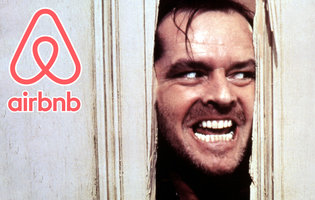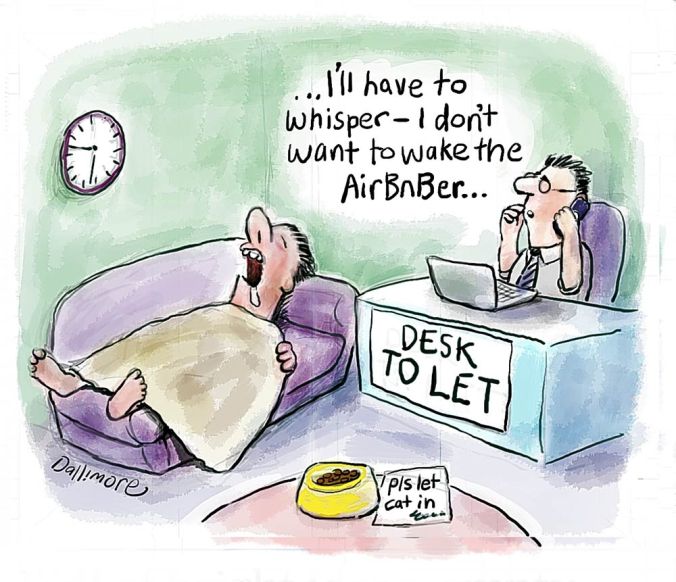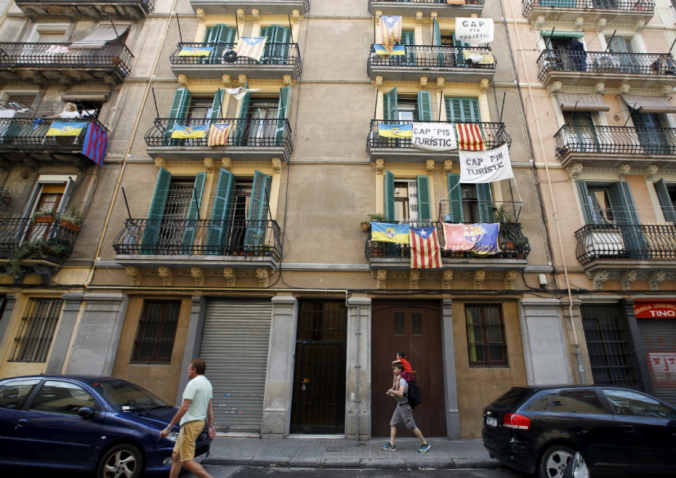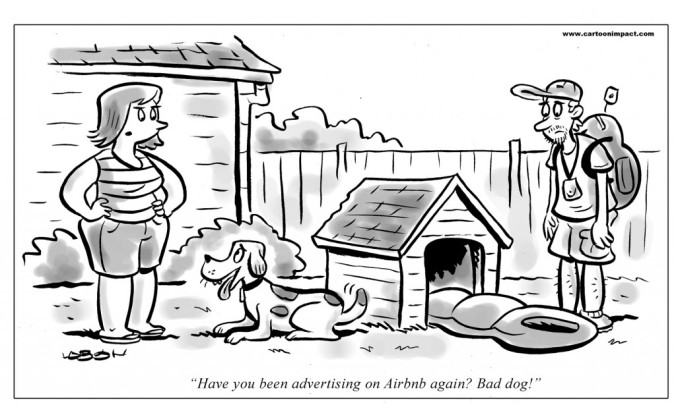
There’s been a massive increase in the number of spare rooms,or even entire flats, offered for rent on AirBnB, across the UK and worldwide. We’ve recently identified several within the building where I live. However this is cause for concern, because there are quite a number of issues with AirBnB. Put rather bluntly, if you are offering rooms on AirBnB you might be breaking the law and you are also possibly jeopardising your neighbours financial well being.
So what’s the problem? This clip from Adams ruins everything sums up the main arguments against AirBnB. Cracked also reviews the major arguments against it.
But for starters, if you are offering rooms on AirBnB what kind of mortgage do you have? Because if you’ve got a owner occupier mortgage that only allows you, your family and non paying guests to stay in the property. Even with a buy to let mortgage only registered tenants on a long term least (generally more than 90 days) are allowed to stay. If you are renting rooms, or worse the entire flat on AirBnB, then you are almost certainly breaking the terms of your mortgage. In theory if the bank finds out, they could tear up your contract and demand immediate repayment (i.e. you get 30 days to come up with say £100,000 or lose the house!).
And this issue of who is allowed to stay in the property is not some minor bureaucratic point. People tend to prioritise mortgage or rent payments above all else, as they don’t want to end up homeless. So the risk to the bank of you defaulting on a mortgage loan is relatively low, hence why they can get away with offering such a low rate of interest on such a large loan. By contrast hotels and B&B’s are a much more risky business (recall Trump’s four bankruptcies involved exactly these sort of properties). They are much more likely to go bankrupt, hence why they have to put up a higher proportion of starting capital and get charged a higher interest rate. While some banks are starting to offer AirBnB compatible mortgages, they generally involve a higher rate of interest and a larger deposit. So unless you are on one of these mortgages, you are likely to be committing mortgage fraud.

Then there’s the issue of home insurance. Again, home insurance assumes you are either renting (long term) or living in a house you own. AirBnB type arrangements aren’t covered. Some insurers are starting to offer AirBnB compatible policies, but as with the mortgages these cost more than a conventional insurance policy. If you are renting out rooms under AirBnB and you lack an appropriate policy, then you (and any of your guests) are likely to be uninsured and there is very little chance of your insurer paying out in the event of a claim.
Also the above only applies to home insurance. There’s also the issue of getting liability insurance (in case you being sued by a guest if he falls in the bath tub or tumbles down the stairs). Then there’s your block insurance if you are in a larger apartment complex. Hotels and B&B’s have to comply with a long list of safety requirements to be given permission by the local council to operate and too convince any insurer to provide them with cover. e.g. does your building have a sprinkler system? I know mine doesn’t, but I know that in some countries hotels (above a certain floor height) are legally required to have one (and this applies even if the building is a mixed development). Hotels tend to have better security arrangements, CCTV, key cards and codes that expire every 24hrs, security guards, etc.
Hotels aren’t doing all this for fun, they are doing it generally because their insurance policy will be voided if they don’t. e.g. in the UK there are no sprinkler requirements, but your insurer (or fire officer) may insist on expensive modifications (e.g. putting in fire walls and new fire escapes) if you don’t have a sprinkler system.
Now I’m not usually the sort of person to get worked up about health and safety, but this is one situation where the H&S killjoys experts have a point – hotels, B&B and hostels do catch fire, there have been several large and often fatal incidents over the years (e.g. the MGM Grand fire or the Downunder Hostel fire in Australia, hence why the regulations are so strict. And no, small B&B’s aren’t exempt, you still have to comply with at least some minimum level of safety.
This raises the question as to whether, in the event of a claim, would the insurance company pay out. My guess is they’ll probably take it on a case by case basis. If a fire started say in an AirBnB rented property, they’d likely pay out to any of the neighbours effected, but refuse to pay out to the AirBnB owner (so he gets saddled with maybe £50,000 of fire damage and he’s still in debt to mortgage company). If it was an issue nothing to do with any AirBnB property (e.g. the roof caves in), they’d likely just pay out and not ask any questions. However in a scenario where say a large number of flats in a block are AirBnB and say the building burns down, the insurer might well argue that the block was essentially functioning as an illegal hotel, thus invaliding the policy and they are within their rights to refuse to pay out to anyone.
Suffice to say, its hard to say which way things could go, it will likely take a few test cases to sort out. However the implication is that if you’ve got AirBnB owners in your building, there is a risk that you might not be fully insured anymore. So anyone renting rooms via AirBnB is having a potentially detrimental effect on their neighbours. Quite apart from all the other issues with large numbers of people coming and going at odd hours.
And as I mentioned earlier, you generally have to apply for planning permission if you are planning to set up a hotel or B&B. And yes, this applies even if you don’t plan to make any alterations to your building (as you are changing the use of your property). In some parts of the world you will also need to apply for a license of some sort in order to operate a hotel or B&B. And this is not some bureaucratic rubber stamp process. Any application from an AirBnB owner for permission to operate has a very strong probability of being rejected. Why?
Well because, as noted, homes and apartment blocks often don’t comply with the same building codes imposed on hotels. There’s also issues like disabled access, which hotellers have to cater for (newly built apartments also have to have disabled access, but older residential blocks don’t) and possibly parking issues. Then there’s the provision of water, electricity, broadband and public services (e.g. bin collections, access for fire engines and emergency vehicles), which will be based on the assumption that all the apartments in a certain area are domestic properties, not defacto hotel rooms. This is why hotels pay business rates to cover these costs. An Airbnb might also need a different form of TV license to those used by a domestic property.
And speaking of which, you are paying tax on any earnings you make from AirBnB, aren’t you? You’d need to declare this as income on your self assessment tax form (as well as paying those business rates, water charges, TV license, etc.). So its very likely than anyone offering rooms on AirBnB is not paying their taxes in full….like David Cameron’s dad, or Jimmy Carr.
Also the freehold (or leasehold) on many buildings may well prohibit any form of AirBnB like activity (mine forbids the operation of any form of business within the block for example). Getting around this is going to be harder than dealing with the council, as you’d need to get your neighbours or the leaseholder to agree (and they’d either say no or insist on a cut of any of your profits).
Another issue for councils is the fundamental matter that they don’t want all the apartments in a city turned into hotels. This makes it harder for people to buy or rent. If its possible for a landlord to kick out his tenants paying £1,000 a month on a 3 bedroom apartment and then move in AirBnB guests paying £50 a night each (i.e. up to £4,500 per month!) everyone would do it and city centres would be full of AirBnB‘s with nowhere for the people who live there to rent. So AirBnB is contributing to the housing crisis in the UK. Hence it is not unreasonable for the authorities to be resistant. And while some aren’t doing much about it at the moment, a crack down is going to come at some point. Already some cities are starting to take action and my guess is that this is only the start.

Protests against AirBnB by renters facing eviction is a growing problem
Then there are other issues, e.g. lets suppose you are an AirBnB owner and one of your guests refuses to leave at the end of his stay (as has happened on a few occasions already), nor will he pay you anymore. What are you going to do? Drag him out by the scruff of the neck? Okay and then when the cops show up they’ll be putting the cuffs on you (for assault) and letting him back in. In the UK a landlord has no legal right to undertake an eviction. Only the courts can sanction an eviction and it can only be carried out by an agent of the court (e.g. a bailiff). Until your tenant has had his day in court, he remains your tenant, you can’t throw him out or harass him in an effort to try and make him leave, indeed doing so would likely make it harder to secure an eviction.
While yes it is true that certain providers of shorter term accommodation can get around the need for a court order, but they still can’t drag someone out of the building (there is a due process they have to go through as well). And they are operating within a tightly defined legal frame work. As I think we’ve established, any AirBnB owners is likely to be operating in legal limbo and is almost certainly in breach of the law. So it would be up to the courts to decide. While they would almost certainly authorise an eviction, that could take weeks. And one wonders what the court will make of someone admitting under oath to operating an illegal hotel, in violation of planning laws, building codes, while simultaneously committing tax fraud, insurance fraud and mortgage fraud.
And note that we are talking about the UK here. UK law blatantly favours the landlord, unsurprising in a country where the landlords and the landed gentry have been making the laws for several centuries. In certain US states or in Europe the legal situation is very different. It can take months, sometimes years to evict someone.
As for AirBnB guests they have to consider the risks they are taking. For example, what do you really know about the person you are renting off? There’s already been a number of clients who’ve been scammed by rogue landlords and con artists. You might find the room you’ve been offered is well below the standards, or even dangerous. There’s even been guests who’ve died during their stay at an airbnb (due to poor safety standards or carbon monoxide poisoning). You might find your host suddenly cancelling on you days before you travel. Note that a recent crack down by authorities in London caused many to lose their bookings. This link includes a few tales of woe from Airbnb guests and providers.

And this brings us to the racial profiling. About the one thing you will know about your AirBnB guests or hosts is what race he is, as he will provide either a photo or a short video. Trouble is you can’t really tell a lot from that. You’re host could be fine, or he could be Begbie from Trainspotting, or an axe murderer on the run from Eastern Europe whose previous premises was the inspiration for the movie Hostel. As a result this has let to accusations of racial profiling or profiling by social class by both hosts and guests.
Certainly, the fact is that the law, factors, insurers and mortgage companies haven’t quite caught up with events. Once they do, they’ll likely re-draft laws and policies to accommodate things like AirBnB. However, this will almost certainly come at a price. AirBnB owners will suddenly find it costs a lot of money and hence there’s a reason why hotels charge £100 a night for a room (because that’s about what it costs to pay off all those bills!) and suddenly AirBnB isn’t the brilliant money making scheme they’d thought (much like Uber). Also changes to the law, while bringing AirBnB the right side of the law, they will probably allow more leeway for AirBnB operators to be blocked from operating, if for example other residences in a block object to it.
And inevitably further crack downs will come at some point, both by the authorities and perhaps private investigators operating on behalf of insurers and mortgage companies. And woe to any AirBnB owner who gets caught in this dragnet.
Reblogged this on daryanenergyblog.
LikeLike
Pingback: While I was away…. | daryanblog
Pingback: The rise of the Contrepreneurs | daryanblog
Pingback: The rise of the Contrepreneurs | daryanenergyblog